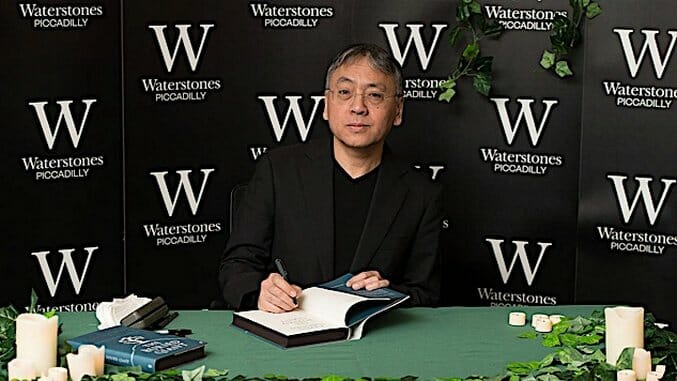Novelist Kazuo Ishiguro Wins the 2017 Nobel Prize for Literature
Photos by Ian Gavan/Getty Books News Kazuo Ishiguro
You’re probably too cool to care, Bob Dylan, but 2017 has seen the unlikely return of lady literature, her worth embodied in the seven novels of this year’s Nobel Prize winner: Kazuo Ishiguro.
Among the most popular of Ishiguro’s novels are The Remains of the Day (which won a Man Booker Prize in 1989, and was made into a film starring Anthony Hopkins and Emma Thompson), about a butler and an English lord in the years leading up to WWII, and Never Let Me Go (shortlisted for a Booker Prize in 2005), which you may have seen in theaters in 2010 and said to yourself, “Wow, dystopian romance must be difficult,” or perhaps, “Curse you, oh gods, another movie starring Keira Knightley that absolutely destroyed me.” Ishiguro’s latest work, The Buried Giant, is unlikely to end up as an Oprah Book Club pick, and that’s the best part about it—or perhaps that’s the fact that it involves sword fights, Sir Gawain and enemies (such as time) that are slain but never defeated.
Older writers are tasked to keep writing, use their reach and accept death in some small way (as per Never Let Me Go, things get precarious if you can live longer than 100 years), while younger writers are burdened with the struggle of finding one’s voice, enjoying glimmers of sage wisdom from older writers every now and then. In an interview with The New York Times in 1989, post-The Remains of the Day, Ishiguro said, ‘’I’m still a relatively young writer … and I tend to write out of a projected fear of what would happen. To combat complacency, I suppose I’m always trying to remind myself in my writing that while we may be very pleased with ourselves, we may look back with a different perspective, and see we may have acted out of cowardice and failure of vision.”
And that, of course, depends on whose vision you trust. Great writing, according to ancient wisdom, is born of “Mnemosyne” (remembrance, memory), who is also the Greek goddess of memory. We live in a society where it’s damn near impossible to put the blinders on and truly smell a book, much less create something built from your own imagination and memory. Today, we celebrate a writer whose work captures the fallibility of memory, modern or otherwise.
‘’What I’m interested in is not the actual fact that my characters have done things they later regret,’’ Ishiguro said in 1989. ‘’I’m interested in how they come to terms with it. On the one hand there is a need for honesty, on the other hand a need to deceive themselves—to preserve a sense of dignity, some sort of self-respect. What I want to suggest is that some sort of dignity and self-respect does come from that sort of honesty.’‘